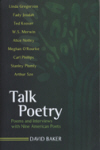Talk Poetry
In my own reading experience, nothing beats the first-person account of the interview, offering as it does an essential glimpse into what’s happening in the mind of the subject. As the instigator of responses in this collection, David Baker takes a rather light hand and offers little fleshiness, certainly no blood, yet presents an easygoing introduction to both the poet-as-person as well as the work.
In my own reading experience, nothing beats the first-person account of the interview, offering as it does an essential glimpse into what’s happening in the mind of the subject. As the instigator of responses in this collection, David Baker takes a rather light hand and offers little fleshiness, certainly no blood, yet presents an easygoing introduction to both the poet-as-person as well as the work.
Either Baker is unwilling to challenge his subjects or he expects these interviews to have the widest possible engagement in terms of audience. Nothing else accounts for the at times rather limpid style of these discussions; comments are rarely revealing, and too often questions posed go out of the way to be complimentary. It’s uncommon to sense any hesitation or uncertainty in answers or questions. For instance, with W.S. Merwin, Baker is more the enthusiast than anything else, declaring “I also love that little one right there.” He also adds comments such as “I love that one” and “what a beautiful poem”—such effusive appreciation undermines Baker’s otherwise adroit presentation. Yet while there’s not terribly much here to cling to for dear life as it were, there remains plenty well worth dipping into, especially for readers not familiar with the poets presented.
Many informed readers already possess a substantial level of feeling for the poets: Linda Gregerson, Ted Kooser, Alice Notley, Carl Phillips, Stanley Plumly, and Arthur Sze. All of them have a substantial publication history with fairly dedicated followings and these interviews only prove to support the reason(s) this is so. The Plumly interview stands out as singular in so far that it is Plumly’s work concerning John Keats that gets emphasized throughout, over and beyond his own poems. Plumly’s Posthumous Keats is a sort of fanciful literary critical memoir which documents his reading of Keats. And he’s not alone on that count; Tom Clark’s Junkets on a Sad Planet comes immediately to mind as a brother text.
The interviews with less well known poets Fady Joudah and Meghan O’Rourke confirm the promise each has of accomplishing further work of significance. Born in 1976, O’Rourke is the youngest poet here, and, while as an editor of the Paris Review she is clearly going to have some notoriety, her publication history is simply such that her name is not as pervasively recognizable. Joudah is arguably more familiar, but this is primarily the case due to his translation work with the poems of Marmoud Darwish, the fact that he won the 2007 Yale Series of Younger Poets Prize, and his professional career as a medical doctor.
Joudah refuses to idly banter about the relationship between his work as a doctor and his poetry. As he says: “I keep them separate. Very few patients know about it. Just as few doctors know, or care, about it.” And when Baker asks, “What does medicine give you for your poetry? And what does poetry give you for medical practice?” Joudah isn’t idle in his response, refusing to dice up the relevant contradictions for easy-going consumption by readers:
The questions of compassion and suffering, beyond their clichéd, hackneyed consumption, seem endless. I rarely, in my practice in the U.S., seek medical narratives as source for my poems. But the overarching reality of suffering and living is a different matter. I am not sure what my poetry gives to my medicine or takes away from it. We live in an intensely administered world and we are automatons half the time, it seems. Obviously, I am somewhat uncomfortable talking about it.
He continues, “I am just as uncomfortable these days talking about my experiences with Doctors Without Borders.” Joudah acknowledges the limits, verging on hypocrisy, within which he pursues his living and his art:
All I can say about that experience is that the horror of this hierarchy of suffering in which we live our daily lives rarely leaves me. It is maddening at times. Especially when I ask myself, as a doctor, as one with power, how I partake in it, and how I have partaken in it.
I am the one who “returns” from these sojourns into “suffering,” and I get congratulated on it, as if it weren’t just a simple act of private common decency, but a heroism that the society to which I return wants to claim as its own (as one once told me: “thanks for doing this in our name”). And to top it all, I make art out of it.
If there’s ever to be accurate and necessary accounting by artists working in leading developed countries such as the United States concerning how we benefit from the privileges granted thereby, Joudah’s words provide one starting place. What is our shared obligation to one another, and all living things, as creatures of the same breath? Not cosmic connection, but built into and from out of our day-to-day affairs. No art should bother continue without asking such questions.





